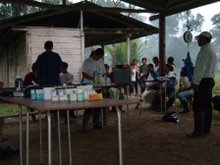I just got back from Juba yesterday, so now I can blog in real time. This adventure is almost over and I'm really grateful for it. I am satisfied that we did the right thing by coming in with the Wharton team to do a careful assessment, asking some hard questions before jumping right in. Sure, you walk away wondering if this trip did any good, but you have to think long-term. It's not always just about feeling good.
And what feels better than practicing medicine? Seeing patients, prescribing medicine after a 15-minute interview, and doing surgeries is very rewarding, from what little experience I have. In Malek, another thing we did was set up a makeshift clinic with the small pharmacy of drugs we brought with us. People came in droves with health problems of every kind. It was uncontrolled madness and we definitely could have organized ourselves and our patients better. My mom and I interviewed and examined the patients with the help of translators, and Orin, Grace and John filled "prescriptions". Sush went to distribute vitamins to the women, and was apparently nearly accused of poisoning them (one of the women told him to swallow a pill himself so they'd know he wasn't trying to kill them all).
It wasn't that we didn't do any good that afternoon. I think we did. We de-parasitized, killed fungal infections, cleaned abscesses, and treated diarrhea. We tried to give clear instructions on how to take the meds, although communication is the most overlooked, most important factor in doctor-patient interactions (and is 100 times harder when you're being ambushed by mothers pushing their kiddos toward you). I can only pray that we did some good. But I am more convinced than ever now that medicine is NOT the answer for rural health, at least not in Malek.
Those kids need clean water to drink, and they need protein. Their bellies are obviously swollen with kwashiorkor. What good will pylotrip do for their ulcers without a proper diet? They need latrines, and they need sewage. They need vaccinations. They need to go to school. They need better housing to shield them from the elements, of which there are many in East Africa, home to a billion bugs and all those cool safari animals.
When we got back to Juba from Bor, we had a debriefing where the Warton team gave my mom and I their impressions of where Universal Unity should go next. They were all against building a clinic, as am I. Not because it's not needed, but because so much more, and so much more basic things, are needed more desperately. And because as a growing organization in its beginning stages, we don't have the know-how, the funds, the time commitment, or the managerial skills to make this happen. We're talking about a location where CRS, a behemoth of an aid organization with 10-year commitments to its subjects, is pulling out. What makes UU's chances better?
I'm not saying we should pull out too. Not at all. I think we should partner with Michael Lear from Real Medicine Foundation and send nurses to his nursing program at Juba Teaching Hospital. We can also help revise the curriculum and bring doctors and nurses in to help train for short periods of time (which is what we have to offer, since no one has stepped up to move to Africa permanently). I think we should refine our "Educate Refugees" project, which needs a lot of help before we take on something new (I knew this before we left for Sudan, and meeting former students in Nairobi only confirms it). In short, I think we should build capacity. In a few years, our students will be engineers and agriculturalists. We just met two high school graduates, Natalina and Mercy, who are hanging around Juba after sitting for the KCSE -- they would be perfect candidates for nursing school. In time, UU will be able to complete our promise to our students that we would help them find their way in life through education. It will be a more complete promise than simply paying their fees, and it would help us do what we've wanted to do all along: help Southern Sudan.
I'm mentioning this on the side, but the current peace agreement between the ever-warring North and South Sudan ends in 2011, at which time there will be a referendum. Kwai thinks the North will never agree to let the South be free for good, and I don't see why they would. He seems to think 2011 will bring war, at which time "you will see Kwai in uniform". With peace this fragile, building a clinic now makes even less sense. Better build capacity in a place where there is none, waiting for 2011 and its aftermath while continuing to educate students in Nairobi and hopefully soon in Juba.
Subscribe to:
Post Comments (Atom)





2 comments:
If I was a REAL nurse I would be first in line to help out with the nursing project you proposed in this post. Very intriguing. Your write-up made it feel like I was there in person.
Very enlightening on the challenges of setting up a clinic abroad. Somehow there are millions of people in need of help, but it's more difficult than meets the eye to get to a place to help them, or at least that's what I'm finding out.
Post a Comment